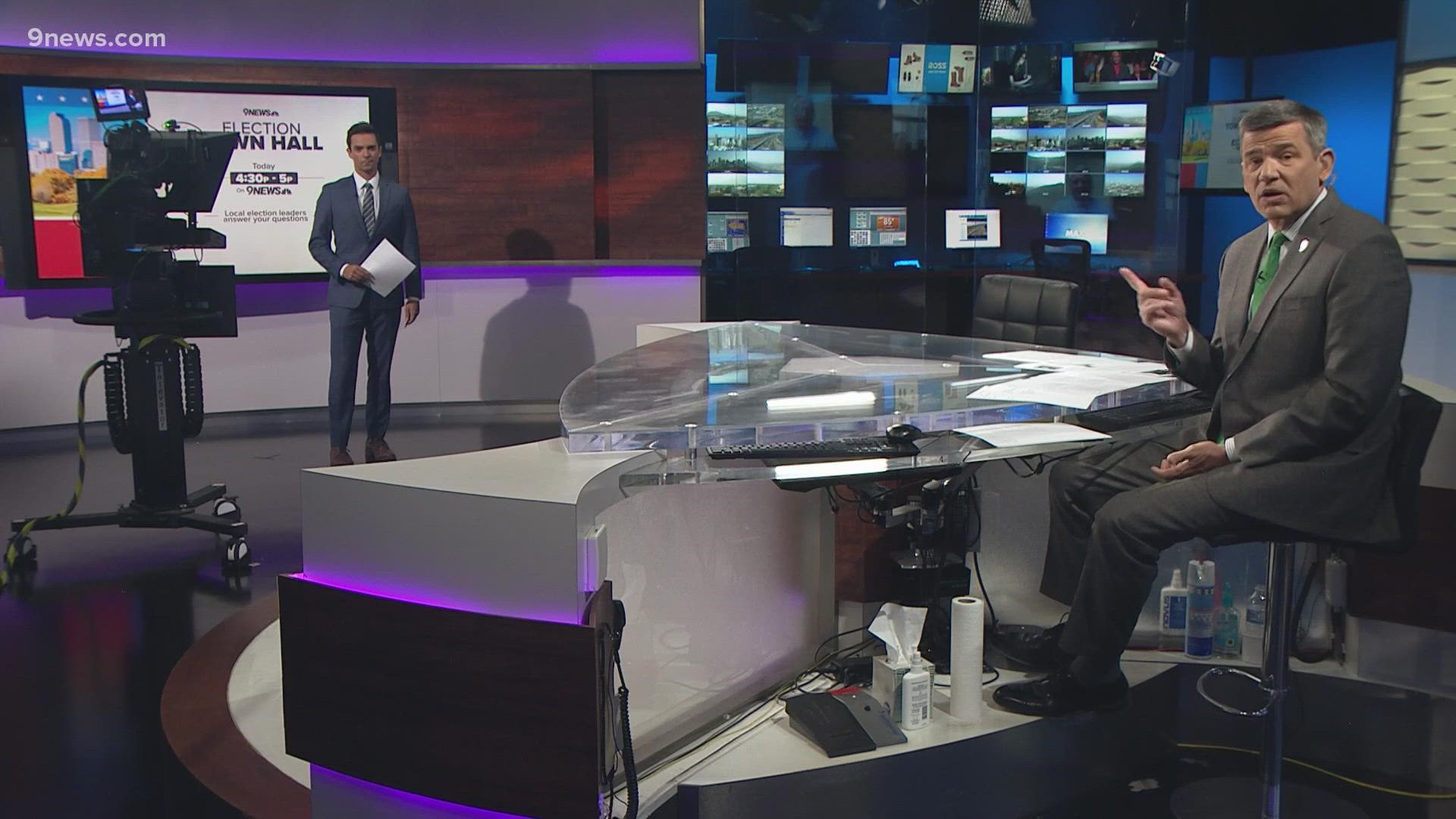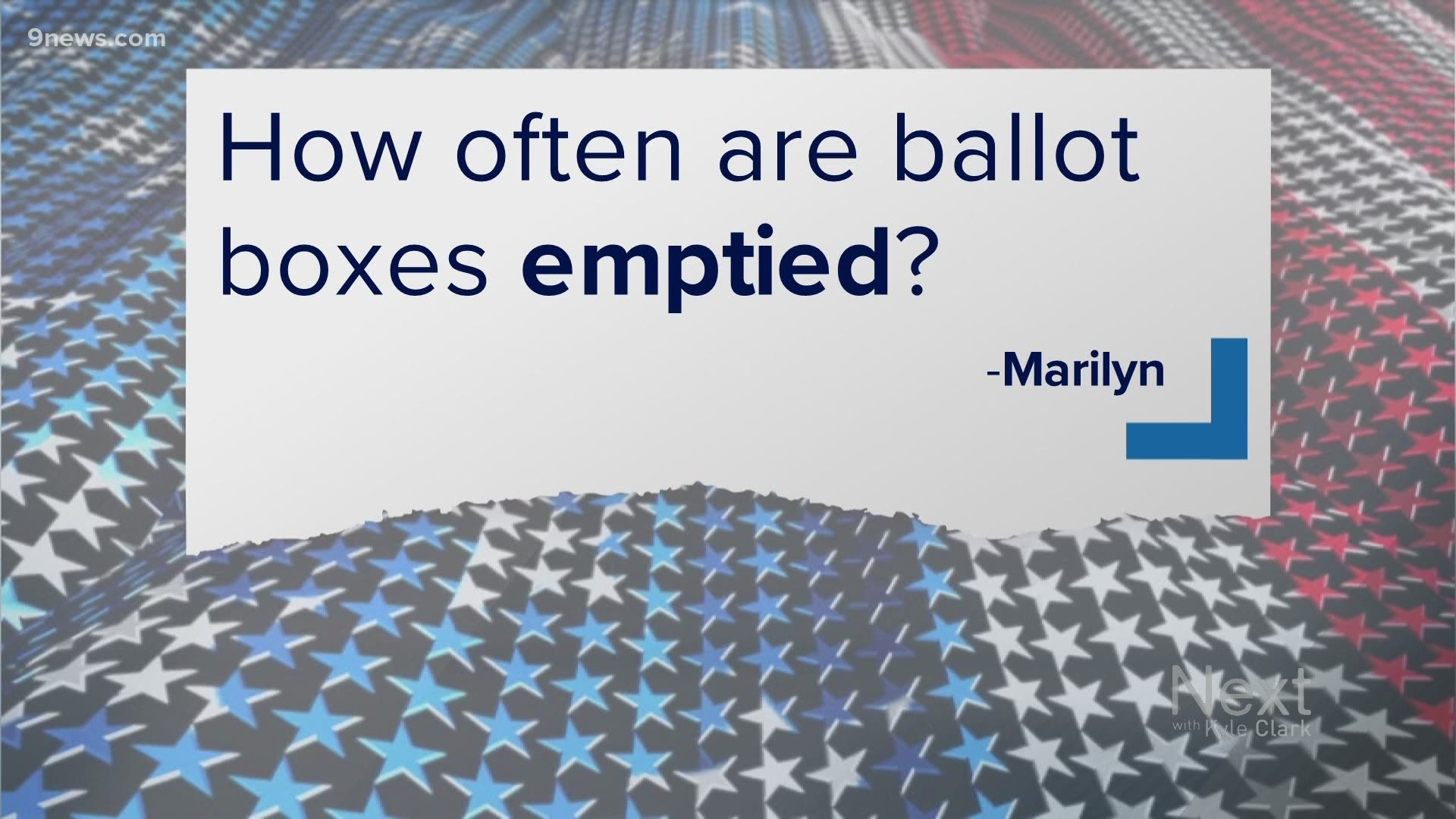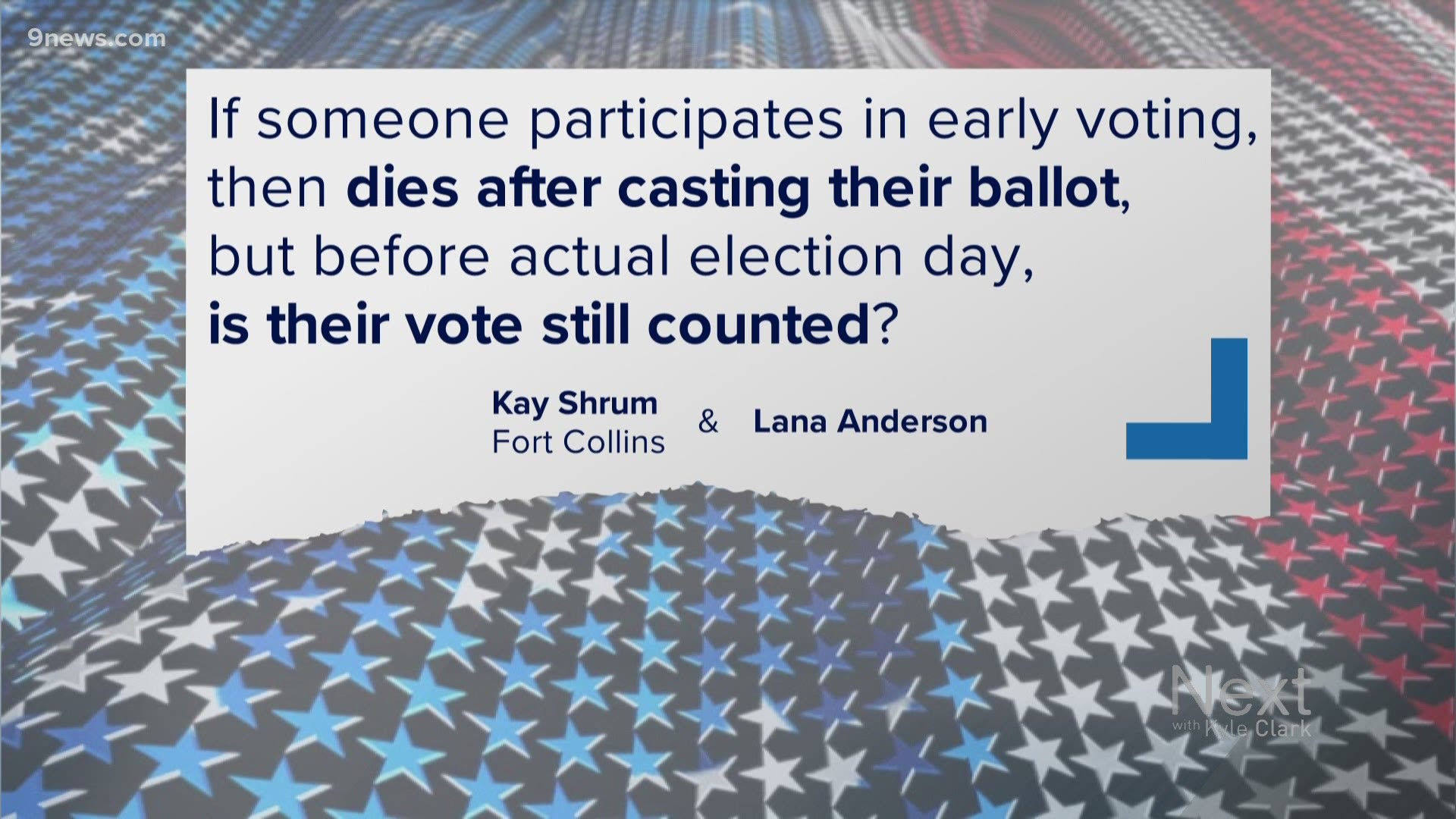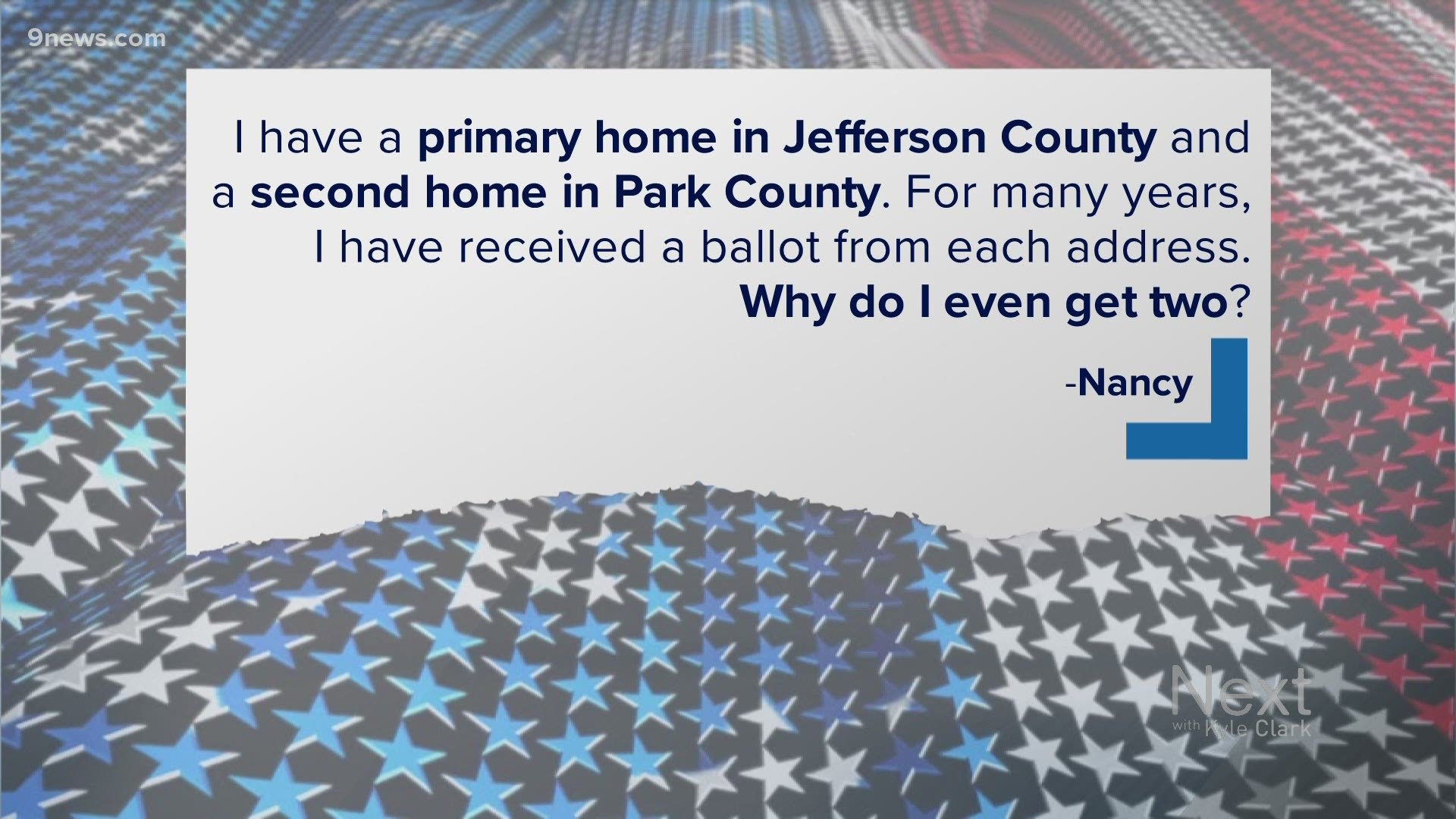DENVER — Three county clerks joined 9NEWS in early October for an interactive town hall to answer your questions about the 2020 election and make sure your vote is counted.
Denver County Clerk Paul Lopez, Douglas County Clerk Merlin Klotz and Jefferson County Clerk George Stern were part of the town hall, and Angela Myers, the clerk in Larimer County, has also helped us answer some of the questions we've gotten since the town hall ended. You can read a recap of their answers below.
We're continuing to take your questions as we get closer to Election Day and will update this page as necessary. If you have a question about voting or your ballot, email next@9news.com.
What's your biggest concern heading into election day?
Lopez: Our biggest concern is to make sure that you have the ability to drop your ballots into drop boxes. Please don’t wait too long to cast that ballot. You can put a stamp on it, pop it in the mail, you can leave it in one of our 38 drop boxes.
There are also 36 vote centers in the city.
I don’t want folks to wait too long to cast that ballot. You can send that in as soon as possible, you don’t have to worry about coming into contact with the virus or anything.
Stern: What we’re most worried about is that people are going to hear that information, those things about the election that may not be true, and throw up their hands and say ‘why would I bother participating?’
I want to make sure everyone knows our elections in Colorado are secure, there are a number of ways to participate. We want people to know that voting is easy and secure.
Merlin: I’ve got to reiterate what George and Paul have just said. We have a wonderful all-mail ballot in the state. My biggest concern is people are getting hung up on the hype of what’s happening in the national news, and they say ‘I’m going to vote in person, that’s more safe,’ and voting in-person isn’t more safe than using the drop box.
Drop it in the drop box, you’re not waiting for the ballot to be processed in the mail, you’re not waiting in line at the polling place. A bipartisan team grabs ballots from drop boxes to central processing, and that’s the same team.
Vote at the kitchen table and drop it in the drop box.
Tell us what that process of mailing out ballots looks like? What's going on behind the scenes?
Lopez: We’re already in action, so we have overseas and military ballots that are coming in, we are getting ready to mail all these ballots out, we’re going to start opening up these drop boxes. There’s 38 of them across the city of Denver, there are going to be drop boxes located over at these other counties as well.
If you put an Arapahoe County ballot in our drop box it will get to us, we’re working together.
Our folks are gearing up, our first vote center opens on Oct. 12, the McNichols building, we’re going to phase in as we go. We’re ready, we’re ready to go. We’ve been socially distancing or physically distancing before it was cool.
I want to encourage folks to vote early.
A lot of people had questions about the all-important signature. Pete from Centennial says, "My 83-year-old dad is concerned that his signature varies, and his vote won't count because his ballot won't match records. What can he do?"
Klotz: If what we have inside is usual, it will be processed through the system. If it doesn’t match criteria, he’ll get a cure letter and have eight days after election day to make a cure.
If it’s really bad, he can get his signature witnessed and it can process through that way.
Myers: When a ballot is received by the clerk and recorder, the signature on the envelope gets reviewed. If the signature matches what's on file for that voter, the envelope is opened, the ballot gets removed and can never be connected to that voter's name again because it has no identifying information.
If there's a signature discrepancy, then the envelope remains sealed, the ballot is not removed, and a group of bipartisan election judges gives another review of the signature. If there is still an issue, the voter is contacted, definitely by mail, perhaps by email depending on the county and if the voter has signed up for email notification. The voter has until eight days following Election Day to "cure" their signature by signing an affidavit that it is, indeed, their signature.
This process also happens if there is no signature. The voter gets notified and can remedy the issue until eight days after Election Day.
That's why when vote totals change following Election Day, it's not because people are somehow voting late. It's because some ballots that are turned in on time have issues that are allowed to be remedied by the voter and then counted by the clerk.
Who's checking the signatures? People or computers? And Steven from Englewood wants to know if whoever's checking them can see how people voted or see their party affiliation. Since mail-in ballots have their signatures verified; it seems that step is somewhat subjective. Because of that, I expect the personnel assigned for comparing signatures (or anything else that is subjective) do not have the ability to see the rest of the ballot, or to see the voter's party affiliation.
Stern: We have trained election judges who’ve been trained by former FBI handwriting experts or officials who are really skilled at matching signatures and knowing what’s on the ballot.
This is before the ballot’s been opened, so they have no idea how you’re voting, they have teams of bipartisan election judges, very well-trained, handling this process.
What does your team do when someone messes up their ballot?
Lopez: In Denver, you have ballots that come with instructions and it tells you how to fill it out in terms of where to circle, how to circle and it also advises you on if you’ve made a mistake. Follow instructions on the ballot and cross out ones you’ve made a mistake on.
You can even write “this is my vote” on it. It comes to a bipartisan team who adjudicates the ballots. There are Republicans and Democrats that look at the intent, determine the intent and then go from there.
But, make sure you’re clear. Make sure to write on it.
What if the ink bleeds through?
Stern: You're OK. We will be able to figure that out. We actually designed the ballots so that the races on the back don't overlap, so that you're not bubbling in something on the back, but if you're concerned about it, it really bled through, get a replacement ballot from your clerk, you still got time to do that up until 7 P.M. on Election Day.
How early do you start counting votes?
Lopez: We have already started processing ballots by 7 p.m. on Nov. 3. So the earlier that you can get that ballot in, the quicker we can prepare it and our election workers, the bipartisan teams, can start getting it in through the process and ready to go.
Never mind the fact that this is a presidential election and in the middle of the pandemic, while we were usually squeezed in together, it requires a lot more space. We want to continue that we are valuing accuracy over speed.
We want to give this a little bit of time, be patient. We’ll continue posting results at 7 p.m., and will be updating them every 90 minutes.
We’ll empty out drop boxes every day.
There’s also been a lot of misinformation about mail-in ballots and allegations of voter fraud… for which there is no evidence. What does your team do to protect against voter fraud? Have you run into this problem before?
Stern: So there’s a ton of information right now about fraud, what we have found across Colorado is that experts on the right or the left are looking for instances of fraud, and we’ve found our elections here are extremely secure.
Our signature verification process allows us to verify who fills out the ballot is who they say they are. They are trained by the FBI, and the whole thing is opened to watchers, who can see the process and how secure it is and how transparent is.
We have not found fraud in our office and we’re looking. We compare every single signature, we’ll send it to the district attorney’s office, but fraud is not a thing we see in Colorado.
What's one thing you want voters to know going into this month?
Merlin: This whole thing is usual. We’ve been doing the all-mail thing since 2014.
We know what we’re doing, nothing has changed, it’s consistent across the state, Colorado is known as the most secure place to vote.
Lopez: Just make sure you vote. Sign that ballot, turn it into the drop boxes, mail it. We have a system for tracking ballots online.
The other thing you can do is visit us at denvervotes.org. We also have curbside ballot service and curbside ballots, you can use too.
Stern: We are all lucky to be voters in Colorado where we’ve had this vote by mail system for seven years. We know how to make it accessible and we know how to make it secure.
We want people to feel good about this process so they participate.
It’s really important, it’s really secure and we want to make sure you show up before 7 p.m. on Nov. 3 so your voice is heard.
Keep reading for a look at the answers to questions we won't have time for in the town hall, but got an answer to.
“With this critical primary election coming soon, I was wondering what happens to a ballot if someone accidentally fails to mark an issue on the ballot? Does it make the whole election ballot null and void?”
- Rudy Gallegos, Arvada
It does not. Here’s an explanation from the Colorado Secretary of State’s Office:
“Yes. If you choose not to vote for a candidate or a ballot question, the rest of the votes on your ballot will be counted.”
“How can I check my signature for my vote?”
- Sara, Fort Collins
The Denver County Clerk's Office said as an initial reference, they use the latest signature from a state transaction — which includes the last ballot. It's not the same signature you might have submitted when you registered to vote at 18.
If an election judge does question your signature, they'll have a list of all the signatures you've provided over the years. If there's a discrepancy, voters have eight days after the election to "cure" their signature.
According to the Colorado Secretary of State's Office, county clerks must notify a voter within three days of discovering a signature discrepancy, but in no event later than two days after Election Day.
Notifications about signature discrepancies will come in the mail, with instructions on how to fix it. This year, voters can also use the TXT2Cure system, where people can use their smartphones to submit information ensuring their votes are counted.
“How do I know if I’m registered to vote?”
- Rose, south Denver
You can review your voter registration in Colorado by clicking here.
It’s worth mentioning that everyone who gets a Colorado driver’s license is automatically registered to vote.
“How can a person with no driver’s license vote in Colorado?”
- Burt Kruhm, Highlands Ranch
You don’t need a driver’s license to be able to vote in Colorado. Here are the acceptable forms of identification according to the Colorado Secretary of State’s Office:
- A valid Colorado driver’s license or valid identification card issued by the Colorado Department of Revenue. (Note: Documents issued to not lawfully present and temporarily lawfully present individuals under Part 5 of Article 2 of Title 42, C.R.S. are not acceptable forms of identification.)
- A valid U.S. passport.
- A valid employee identification card with a photograph of the eligible elector issued by any branch, department, agency, or entity of the U.S. government or of Colorado, or by any county, municipality, board, authority or other political subdivision of Colorado.
- A valid pilot’s license issued by the federal aviation administration or other authorized agency of the U.S.
- A valid U.S. military identification card with a photograph of the eligible elector.
- A copy of a current (within the last 60 days) utility bill, bank statement, government check, paycheck or other government document that shows the name and address of the elector.
- A Certificate of Degree of Indian or Alaskan Native Blood.
- A valid Medicare or Medicaid card issued by the Centers for Medicare and Medicaid Services.
- A certified copy of a U.S. birth certificate for the elector.
- Certified documentation of naturalization.
- A valid student identification card with a photograph of the eligible elector issued by an institute of higher education in Colorado, as defined in section 23-3.1-102(5), C.R.S..
- A valid veteran identification card issued by the U.S. department of veterans affairs veterans health administration with a photograph of the eligible elector.
- A valid identification card issued by a federally recognized tribal government certifying tribal membership.
Any form of identification listed above that shows your address must show a Colorado address to qualify as an acceptable form of identification.
The following documents are also considered acceptable forms of identification for voting:
- Verification that a voter is a resident of a group residential facility, as defined in section 1-1-104(18.5), C.R.S.
- Verification that a voter is a person committed to the department of human services and confined and eligible to register and vote shall be considered sufficient identification of such person for the purposes of section 1-2-210.5, C.R.S.
- Written correspondence from the county sheriff or his or her designee to the county clerk indicating that a voter is confined in a county jail or detention facility.
“What is the original signature that is compared in signature verification? I registered to vote 50 years ago and I’m sure my signature has changed.”
- Lynne, Jefferson County
The signatures on file include the most recent transactions with the state, such as your last ballot.
That means your signature is definitely not the one from when you first registered to vote.
“Being that there are so many homeless people, do they get to vote for president or do they have to have a permanent residence?”
- Marsha Blalock, Denver
Voters don’t need a permanent address to cast a ballot in Colorado. Here’s an explanation from the Colorado Secretary of State’s Office:
“If a voter lacks a fixed permanent address, then a residential address does NOT need to be provided when registering to vote. For example, a voter who permanently resides in an RV may use a campground as a "home base" for voter registration purposes.
“Likewise, individuals who cannot afford regular or adequate shelter may use a park, vacant lot, or homeless shelter as a ‘home base’ for voter registration purposes. The voter may provide any physical location as an address if he/she intends that location to be their ‘home base.’”
“Can someone take their senior neighbor’s sealed ballot to the drop off ballot box?”
- Name and location unknown
Yes, any person an elector chooses or any duly authorized agent of the county clerk and recorder can deliver a ballot to a drop box.
But in Colorado, no person can return more than 10 other people’s ballots at once. Your ballot states it like this: "It is a violation of law for an individual to receive more than 10 voted ballots for mailing or delivery in any election."
Stern: It is terrible legalese. And I like what you just suggested, I think it is better, we'll look at that for the next race. Maybe you've got a neighbor you know hasn't been leaving the house because of COVID, you offer to take their ballots to the dropbox, that's all fine, as long as you're doing no more than 10. Yours counts, so up to 10 ballots, including yours.
And that is 10 ballots each election. Not per hour. Not per day. Each election.
"If someone participates in early voting, then dies, themselves, after casting their ballot, but before actual election day, is their vote still counted?"
-Kay Shrum and Lana Anderson
Myers: If we get their ballot and it's processed, it absolutely already counts. There's no way to pull a ballot out of there. It's a similar question to, "I want to change the vote on my ballot." We can't pull it out once it's processed, I don't know which ballot is yours. It's mixed in with everyone else's."
"I just completed my mail-in ballot as a resident of Jefferson County. On the ballot under the signature line is another line with "TODAY'S DATE" and next to that line another space for "Witness Legal Name." Am I required to enter the date? What if I don't? Does that invalidate my ballot?"
-Joe Sullivan
Stern: We love when people read our materials this closely because someone's paying attention, Thank you so much. You do not have to date. We prefer you date, it helps us with our processing, but we actually used to say, 'sign and date.' We removed "and date" because it's not technically required. The only thing required is your signature.
Check out the links below for information from the 9NEWS voter guide:
SUGGESTED VIDEOS: Politics




